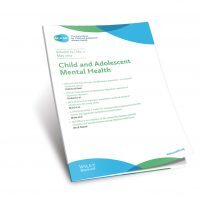Anorexia Nervosa
-

Performing Well but not Appreciating it – A Trait Feature of Anorexia Nervosa
In this Papers Podcast, Professor Kerstin von Plessen discusses her co-authored JCPP Advances paper ‘Performing well but not appreciating it – A trait feature of anorexia nervosa’.
Read more -

Spotlight on Eating Disorders
Eating Disorders Awareness Week (26 February – 3 March 2024) is an opportunity to bring a spotlight on eating disorders and to improve awareness of the impact that eating disorder can have on children and young people.
This Eating Disorder Awareness Week, we encourage you to explore the FREE learning opportunities available on our website, and to share with your networks.
Read more -

RESHAPE Study: Key Takeaways on Eating Disorders
In this ‘RESHAPE Study’ series episode, Professor Tamsin Ford and Clara Faria explore the findings from the ‘National Study of Health and Wellbeing: Children and Young People’ as they relate to eating disorders, and why these findings are important.
The ‘RESHAPE Study’ series is a new mini-in conversation series that will explore the RESHAPE study and the impact of its findings for parents, teachers, policymakers, and mental health professionals.
Read more -

Narrative Matters: Wasting away and fed up – dietary battles in history
Paper from the CAMH journal – ‘Histories of anorexia nervosa (AN), mostly written since the 1970s, have a standard narrative. The story is of largely Eurocentric self-starvation in adolescent girls in response to sociocultural pressures on women who are trapped in disempowering patriarchal systems.’ Jane Whittaker
Read more -

Performing well but not appreciating it – A trait feature of anorexia nervosa
Open Access paper from JCPP Advances – ‘We offer a novel behavioral method for measuring perfectionism independent of self-report, and we provide tentative evidence that this behavioral manifestation of perfectionism is evident during first-episode AN and persists even after recovery.’ Tine Schuppli Hjerresen et al.
Read more -

Dr. Rachel Elvins
Dr. Rachel Elvins is a Consultant Child and Adolescent Psychiatrist at Royal Manchester Children’s Hospital & Salford CAMHS. She is an Associate Editor of CAMH, responsible for the Debates section.
Read more -

Eating Disorders – Perception, Prevention, Intervention
According to the World Health Organisation, in 2019 almost 3 million children and young people, worldwide, experienced eating disorders. This Eating Disorder Awareness Week (27 February – 5 March 2023), we encourage you to explore the FREE learning opportunities available on our website, and to share with your networks.
Read more -

Eating Disorders and CAMHS – Real Life Insights
Eating disorders, such as anorexia nervosa and bulimia, are not straight forward; to celebrate eating disorder awareness week, we spoke to Marie Young (pic), a Child and Adolescent Mental Health Service (CAMHS) Eating Disorders Specialist Nurse, and Bea Fenske, an Eating Disorders Nurse, from Community Eating Disorders Service (CEDS) Bedfordshire and Luton CAMHS, to give us an overview of what it is like to work in a Community Eating Disorders Service.
Read more -

How England’s calorie labelling policy is impacting young people
Last year the government introduced the out-of-home calorie labelling policy in England to help people make informed nutritional decisions as part of a broader strategy to reduce rates of obesity. However, little is known about how this policy impacts young people’s mental health, especially those with lived experience of eating disorders. Here we summarise the existing research and highlight areas for further investigation.
Read more -

Incidence and outcomes of eating disorders during the pandemic: what has changed?
During the pandemic, the NHS CAMH eating disorder services saw almost a doubling in the number of referrals for eating disorders and waiting list times are now surpassing what is recommended. This surge in eating disorder presentations in clinical settings led researchers to wonder what impact, if any, Covid-19 had on the incidence of eating disorders in young people.
Read more